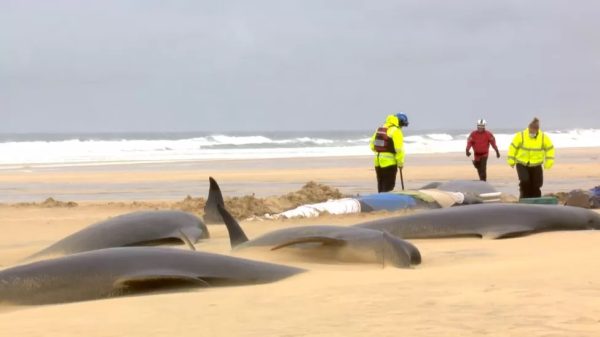Stranded Western Isles whales may have been helping pregnant female

- Update Time : Saturday, July 22, 2023
- 70 Time View

A pod of 55 whales may have become stranded on a beach in the Western Isles after trying to help a female which was having difficult giving birth, scientists believe, reports BBC.
Only 15 were alive after they washed on to Traigh Mhor beach at North Tolsta on the Isle of Lewis on Sunday morning.
One is thought to have been successfully refloated, but the rest were euthanised on welfare grounds.
It is the highest number of stranding deaths in the UK for at least 70 years.
Another whale – believed to be a minke – was also stranded on the same beach on Thursday afternoon, although that incident is not thought to be related.
Marine experts have been carrying out a “monumental and exhausting” post-mortem investigation on the animals since Monday.
No definitive reason for the stranding has yet been given, but a high number of females in the pod were pregnant with several in the process of giving birth.
Pilot whales are known for their strong social bonds and so, often when one whale gets into difficulty and strands, the rest follow.
Veterinary pathologist Dr Andrew Brownlow, director of the Scottish Marine Animal Stranding Scheme (SMASS) team carrying out the post-mortems, told BBC Scotland’s Drivetime programme it had been one of the most difficult processes they had been involved in.
He said: “We have collected a large amount of data and samples about the animals and we can hopefully use this to start putting together a picture of what has happened here.
“There was an initial thought that one of the reasons these animals may have come into this shallow bay and stranded was that one of the females was in difficulty in the process of giving birth.
“That was borne out by our examination of one of the whales.”
About 55 whales were stranded on Sunday morning
Brownlow said his team’s examinations of the pod showed they had been “generally quite healthy and in very good body condition”.
However, he said: “They don’t seem to have been feeding recently at all. These animals were quite dehydrated.
“They didn’t seem to have come into the local area to have derived energy.
“What we’re interested about now is working out why these animals were in that part of Scotland.”
‘Avoid the area’
Dr Brownlow said Thursday’s stranding of a minke whale was not currently being directly linked to the mass stranding on Sunday.
He said: ” It is curious that we’ve had two strandings on the same beach… but there is an awful lot of marine life out in the region at the moment.
“There are huge pods of common dolphins that are being seen and they all seem to be in very good condition.
“There’s also a very large number of minke whales, so they may not be related at all and it could just be a coincidence.”
Western Isles Council – Comhairle nan Eilean Siar – has asked people to avoid the area as the operation to remove the whales takes place.
Between 60 and 70 pilot whales came into shallow waters in Sutherland in 2011 while 21 died during a stranding at Pittenweem in 2012.
According to the Natural History Museum, the largest UK stranding took place in 1927 when 126 out of more than 130 false killer whales died in the Dornoch Firth in the Highlands.
There are also accounts of a mass stranding of pilot whales at Dunbar, East Lothian, in May 1950 with some reports saying 147 were found on the beach.















